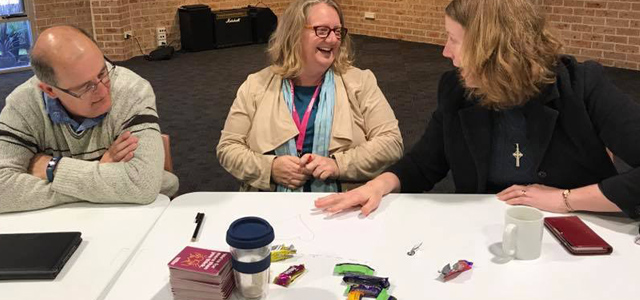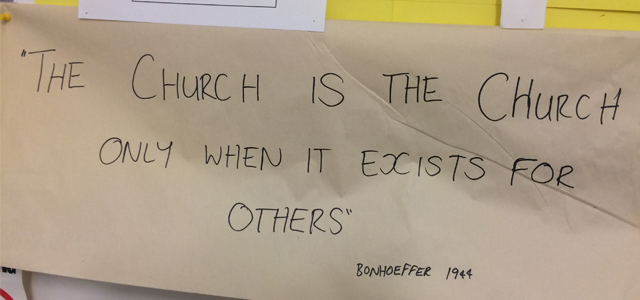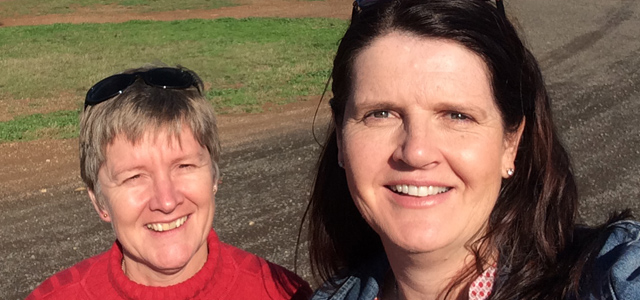As the Uniting Church in Australia celebrates 40 years, it is a good time in 2017 for the Synod of NSW and the ACT to reflect on where we have come from and who we are called to be. It is a good time to take stock and to ensure we are aligned with the moving of God’s Spirit in the world today.
It is a good time to dream a new dream for God’s people in the Uniting Church and to move with hope into God’s future. It is a good time to be reminded of the energy that brought the Congregational, Methodist and Presbyterian Churches into union and to inject new energy into our life together today.
We understand our legacy, but what will our investment in the future be? The Pathways Project is developing processes which will enable us to listen to each other – to help Congregations hear the stories of other Congregations; to help Presbyteries hear stories of Congregations within and beyond their bounds and of other Presbyteries; and to help the Synod hear a more comprehensive story of the Church in NSW and the ACT.
Shaping the future
Currently in a pilot stage across two Presbyteries that each share unique challenges, The Pathways Project is giving members of the Church an opportunity to contribute to the shaping of the Uniting Church for the next 40 years. Leaders and members of the Church in New England North West and Parramatta Nepean Presbyteries are dreaming together to discover how to shape ways in which we might work together to share Christ’s story of love in the world.
Findings from this initial pilot will be presented at Synod when it gathers on 30 September with a view to then opening up the process to the whole Synod.
“Parramatta Nepean Presbytery is a large and somewhat difficult Presbytery covering most of Western Sydney, with all of the joys and pain of people in this part of the world,” says Geoff Stevenson, Presbytery Chairperson of Parramatta Nepean. “There is a broad diversity of people from across the world in [perhaps the most] multi-cultural Presbytery. It is a region of significant change, as new housing is bringing 100,000s of people into two significant parts of our Presbytery — the North-West and South-West Sectors.”
“These significant changes, along with the major upheavals rocking our whole society in this time of semi-millennial change, have a huge impact upon the Church. Our Congregations, based in more traditional village style forms and with traditional forms of ministry, are struggling.”
Geoff is hopeful that The Pathways Project will provide outside resources that will help the Presbytery see more clearly, be accountable in mission and ministry, ask questions of them and provide skilled people who can assist our strategising and planning processes.
“The Project promises to provide a framework that will enable us to move with confidence and support into new ways of experimentation and learning, trial and error, and, we believe, new ways of being the Church in Western Sydney in our time and contexts,” explains Geoff.
Opportunities to hear the voices of both the densely metropolitan Presbytery and the more isolated parts of the state have given Rev. Will Pearson, Chairperson of New England North West Presbytery, hope for the next 40 years of the Synod of NSW and the ACT.
“Each section of the community has their own specific issues that impact on the ability of each to express their faith and commitment in a 21st Century world,” explains Will of the challenges that lie ahead for the Church. “Underlying these is the unity that is so much stronger as we move into the next 40 years in the life of our amazing Church.”
“These meetings and discussions across the state give members of the Congregations who may not be able to experience Presbytery or Synod meetings an opportunity to share both their dreams and frustrations in a safe environment, knowing that their input can be used to form a more complete picture of the UCA in 2017, and be utilised in the development of our ongoing mission.
“At the Armidale meeting [in early July] there was a good representation of church members from within the local and adjoining Congregations who joined in healthy discussion of the topics as they were raised. They were not afraid to voice their understanding of what the Church may be as we transition into the next 40 years.”
Future-focussed missional priorities
Pathways sits alongside other Synod-wide, inter-related projects, in the context of identifying missional priorities and creating an integrated, future-focussed plan for
the Synod.
As Acting General Secretary Rev. Jane Fry has said, “There is an urgent need to find new ways to engage with our communities, to tell our story and to plan for the future. And yes – it is really scary and (at the same time) exciting.”
“We are committed to keeping before the Church our purpose by asking who are we called to be, and why do we do what we do. We want to encourage clear and open communication and consultation, across the whole Church. In doing so, we acknowledge the vast differences, diversity and needs across Presbyteries and membership as we seek to love and care for the people around us,” says Rev. Fry of the commitment to The Pathways Project from a ‘whole of Church’ perspective.
“At the end of 40 years, Moses took the people up the mountain and he showed them the promised land — a land flowing with milk and honey — a fantastic prospect; a place of opportunity, possibility and hope. We are at the top of the mountain looking forward into a land full of possibility and hope. And as Synod we have to get ready for that.
“The Uniting Church is a unique organisation in the way that it structures itself. It is a grassroots organisation. Leadership and direction comes from people in Congregations and Presbyteries working to feed the hungry, clothe the naked and bind up the broken hearted. That’s where the work of the Church happens.
“We need as a Church to organise ourselves in relation to the missional priorities that are evident in the Congregations and Presbyteries,” says Rev. Fry of the priorities for the Synod.
Pathways on the road
Of course such an undertaking needs experienced people to begin to understand how we as a Church can work together more effectively to achieve our goal of being a ‘fellowship of reconciliation’.
Rev. Kath Merrifield has been released from her position as Executive Director of Uniting Mission and Education — along with Melanie Dicks from Uniting — to carry out the initial pilot consultations across New England North West and Parramatta Nepean. Such diverse Presbyteries have been chosen to understand the unique challenges faced by rural and urban Presbyteries, but also to listen and report back so
that these challenges can be addressed.
“Having been in a Congregation and worked with Presbyteries and then in my Synod role, part of the challenge for us is the way in which we take seriously the inter-conciliar nature of the Church,” says Kath about her role as a consultant to the project. “Pathways is an opportunity to explore what can be achieved together in more effective and helpful ways. We find ourselves in a complex, time poor and ever-changing environment in the Church and working together and telling the same story is more important than ever.”
I have worked with the gifts of the Uniting Church for the majority of my work life,” says Melanie about her experience and why The Pathways Project is important in the life of the Church.
“I’ve worked in and managed Uniting Aged Care facilities and I’ve seen how the light of Christ has been expressed through these services to the community. Uniting Church Presbyteries and Congregations have created such great gifts for the disadvantaged and aged in society. In a rapidly changing society, The Pathways Project gives us an opportunity to work with members of the Church to create a long-term plan for the future of the Church.”
Creating opportunities
As Kath and Melanie road-trip across the state, they are listening and making space and time to hear members concerns, hopes, dreams and ways that the Church can collaborate at all levels.
“The project creates an opportunity for us as a Church to have a shared conversation. Everybody sees different aspects of this story at the moment, but this creates an opportunity where we can all contribute to the same story to find the opportunities for the future,” says Melanie.
“My hope is that people will think, talk and take hold of the opportunity to chart a hopeful vision where we can live out the work of Christ in society, but also how we can work more effectively together as a Church. We want to work to make the vision real and map out a plan to get there. I would also hope that we can see the challenges as opportunities to work more closely to create a vision for the future. We want this project to connect with Presbyteries and Congregations and how they see their future.
“From our stories, we will celebrate and build on our strengths, and we will also seek to give shape to ways we can address the challenges that we face together so that we might be well-prepared to embrace the next 40 years!”
“The things that we have in common are the things that enable us to dream and vision a future for the Church. We are about God’s mission in the world,” says Kath. “Alongside our brothers and sisters, whether that be the next Congregation or across the state, it enables us to share a common vision for the Church.”
As pilgrims we are invited to think about opportunities, to let go, and move forward in faith. The Pathways Project will help us to begin to chart a hopeful future in a changing and challenging landscape.
Find more information about the Pathways Project, including Q&As and ways you can give feedback to the process. Also, ‘like’ the Uniting Church in Australia, Synod of NSW and ACT Facebook page for regular updates on The Pathways pilot project.
Adrian Drayton







